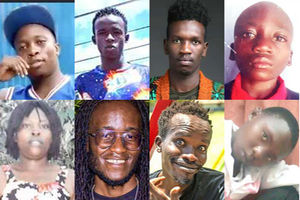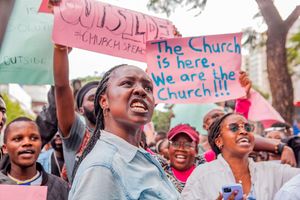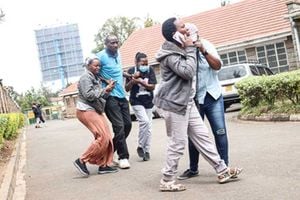
A police officer aims a teargas canister Anti-Finance Bill at protesters on June 25, 2024 on Kenyatta Avenue in Nairobi.
They have become so brazen that they aim their guns directly at Kenyans, sometimes firing bullets and sometimes tear gas canisters, maiming, injuring and killing.
These people, police officers who are trained to safeguard and protect people's lives, have turned the script upside down and are now doing the exact opposite. They are accused of not only shattering the dreams of Kenyans agitated by the country's poor governance by inflicting maximum pain but also killing unarmed young protesters.
Kenya has seen an unusual kind of demonstration in the last two weeks. Young people, the Gen-Zs, have been engaging the police in running battles as they protest against the Finance Bill, 2024. Unlike their predecessors who came armed with crude weapons and stones, the Gen-Zs came armed with smartphones, bottles of water and placards.
Nevertheless, the police rained tear gas canisters, water cannons, blank and live bullets on the harmless youth. At least 24 Kenyans lost their lives, according to human rights groups in the country. Many of the dead were under the age of 30.
The first death was recorded on June 20, 2024, when a protester, 29-year-old Rex Masai, was shot dead as he ran from police officers in Nairobi.
The officer believed to have fired the fatal bullet was caught on CCTV. However, he did well to cover his face with a black cap. His face was eventually found through an online investigation that tracked his steps earlier that day.
He was wearing blue jeans and white sneakers. He later added a short-sleeved jacket. He was seen making rounds in various parts of the city, including along Kenyatta Avenue, Moi Avenue, Tom Mboya Street, City Hall Way, opposite the Supreme Court and on Uhuru Highway.
Kimathi Street
Along Kenyatta Avenue and Kimathi Street, another police officer, identified as Corporal Isaiah, who joined the police service in 2008, did his best to be remembered for his brutality.
Firstly, he was seen on several occasions firing multiple rounds of teargas at otherwise peaceful demonstrators, who learned to avoid his path as soon as they spotted him.
At one point, he fired a tear gas canister directly at journalists who were filming the police's ruthless treatment of a protester and bundled him into a police van.
At close range, no more than two metres, he aimed his firearm at the journalists and fired directly into the stomach of one journalist.
He did this in the full knowledge that all the cameras had recorded his actions, a demonstration of the arrogance and sense of invincibility that has recently gripped some uniformed officers.
At Parliament, several officers were filmed firing live bullets at the thousands of youths who managed to break through the police barricade and enter the August House. They were armed with smartphones, water bottles and the Kenyan flag. Most of the youth believed that if they carried the flag, no one would dare shoot at them. They were wrong.
Within minutes, several people had been shot and, sadly, five had died.
One of the officers identified at the scene bore an uncanny resemblance to a retired Kenya Defence Force officer. This was not the first time he had been in the spotlight for the wrong reasons.
In April 2022, he was detained at Lang'ata police station after being accused of assaulting a woman at a popular club in the estate.
The officer, a gun-toting agent, is said to have fired into the air as he assaulted the woman, scaring away revellers who were enjoying their night out at the Summers Bar in Lang'ata, Nairobi County.
However, when contacted by the Nation, he denied being the person captured in photos taken at Parliament showing him and other officers firing directly at protesters.
On June 18, the very first day of the protests, social media influencer Hanifa Adan was arrested by plainclothes officers and her bag was snatched in full view of cameras by a plainclothes officer believed to be working at one of the city's main police stations.
Apart from these officers, whose faces and actions were captured, Kenyans have been concerned about the activities of an undercover police unit operating in an unmarked maroon Ford Ranger double-cabin vehicle. The officers in this feared vehicle have been spotted wearing overalls bearing badges and flags of different countries. Their faces, which are never seen, are always covered by heavy masks and caps to complete the sinister look.
The Nation understands that one of them is a musician who has released dancehall songs.
They have been accused of abducting and firing live bullets at protesters in the heart of the city over the past two weeks, with other officers carrying out the abductions at night.
Social media influencer
This was the story of social media influencer and Saturday Nation columnist Gabriel Oguda, who wrote in the local dailies that he was abducted from his home in the early hours of the morning. His phone was confiscated and, after being taken to several unknown locations, he was finally driven to Kajiado police station where he was held for almost two days, days punctuated by interrogations by police officers who wanted to know about his involvement in the anti-tax protests in the country.
Several other people believed to be leaders of the violent protests that have rocked 35 of the country's 47 counties have also been abducted on separate occasions over the past two weeks.
Some have returned so shaken that their hard-line anti-government stance has withered, even withdrawing from social media and protests.
One such person is the president of the Kenya School of Law (KSL), Joshua Okayo, who went missing last Wednesday (June 26) in Rongai, Kajiado County.
Before his disappearance, he had been a vocal critic of the now-withdrawn Finance Bill 2024, which many Kenyans felt would have burdened them with more taxes.
Mr Okayo was found three days later in Murang'a, where he was believed to have been dropped by his abductors. How he got there, some 103 kilometres from Rongai, is not known.
Regis Wanjala, an active social media influencer who has been involved in the protests, was also abducted on the same day and was found disoriented on a tea plantation in Ruiru last Saturday.
Former St Paul's University president Kevin Kori Gathura, who was abducted in Nairobi on Thursday and missing for three days, was found yesterday morning.
Another social media activist still missing is Kabatila Munyithya. He was last seen last Friday in Embulbul, Kajiado County. On the same night, at around 1am, he called for help, saying that unknown people had invaded his compound. This was the last time anyone heard from him.
Last Thursday was a day like no other in Rongai. Gunshots filled the air for most of the night. The police shot so indiscriminately that eight bullets landed on a 12-year-old child, Kennedy Onyango, who died on the way to hospital.
Locals accused the police of forcing subdued Kenyans, particularly those caught in the Clean Shelf Supermarket on suspicion of looting, to lie down before shooting them.
In Githurai, as President William Ruto addressed the nation last Tuesday following the protesters' successful entry into Parliament, thousands of residents lived in fear. The sound of gunshots filled the air for hours. Several people are reported to have died in the shooting.
One of the young men believed to have been among the rioters that Tuesday night was abducted before being released in Roysambu with serious head injuries.
In a separate incident, a doctor, Margaret Oyuga, who was assisting a protester with a bullet wound, tragically lost her life after being shot by a plainclothes policeman.
All this despite President William Ruto's directive last week that all abductions in the country must stop and that all those abducted and held incommunicado must be released with immediate effect.
On assuming power, the Head of State also vowed that there would be no more cases of abductions, extrajudicial killings and police impunity in his government.
He also reiterated the same sentiments in his media roundtable on Sunday, June 30, night, where he said he would not condone any form of extrajudicial killing and added that any police officers sent to quell the chaos that followed the anti-finance bill demonstrations would be held accountable for their actions during the protests.
To date, no officer has been arrested or tried for any of the above actions.
The Independent Policing Oversight Authority (IPOA) said in a statement last Friday that it had launched investigations into the deaths of two protesters, Rex Masai and Evans Kiratu, allegedly caused by the police.
Fatal shootings
In both investigations, the IPOA has attended the post-mortems and obtained reports on the cause of death. It has also taken witness statements and is currently analysing CCTV and video footage of Rex's shooting.
The authority also said it had summoned various police officers and obtained necessary police records to assist in the investigation.
Anne Makori, the chairperson of the IPOA, noted that they have observed fatal shootings of protesters in Nairobi and other parts of the country, shootings resulting in serious injuries to protesters, instances of excessive force by police officers against civilians and injuries to both civilians and police officers.
To date, the Law Society of Kenya (LSK) has raised pertinent questions about these unconstitutional police tactics and announced its plans to go to court to stop police officers from carrying out their duties without uniforms.
LSK chairperson Faith Odhiambo said they would be filing a petition over the dress code of police officers during demonstrations.
She said there were some police officers who were operating in civilian clothes and carrying guns, making it difficult to know whether they were really on duty or not.
"We will file a petition. The police should be properly dressed and identifiable so that people know it is a police officer. Seeing police dressed as thugs and fully armed creates a lot of fear. How can you hold someone accountable if you cannot identify them?" asked Ms Odhiambo.
She claimed that whenever police officers cover their faces with bandanas, their aim is to perpetuate violence.
The cases of abductions and enforced disappearances seem to have crossed the bridge and are now affecting police officers believed to be supporting the anti-government protests.
For example, police officer Jackson Kuria Kihara alias @Shakurthecop, who openly took and shared photos of himself carrying posters against the Finance Bill, 2024, much to the delight of social media users, went missing four days ago.
His family has been searching for him in vain, with all their pleas now directed at the government and President William Ruto to help locate the officer.
The Nation understands that the officer was released at 7pm on Monday.
His lawyer said the officer was driving inside Githurai when a vehicle blocked him.
"Three well-built men jumped out of the other vehicle and forcibly pulled him out of his car and into the other vehicle," Mr Njeru said, adding that he had been held incommunicado within Nairobi.
Some of the posters he shared on social media criticised some of the proposals in the Finance Bill 2024. He shared the images while dressed in full police uniform.
One poster read: "Sanitary towels should be free. Unafikiria tax sana Zakayo. Power belongs to the people."
Another read: "Guns should not be used on peaceful demonstrators, save them (bullets) for Haitian gangs.
According to the National Police Service (NPS) Standing Orders, 'a police officer, when using social media privately, shall not purport to make an official comment on social media in his capacity as a national police officer on any incident, police policy or procedure without prior authorisation and in accordance with the media policy.
“The spokesperson appointed from the office of the Inspector General or respective Service Headquarters is responsible for representing the service externally on matters concerning communities, crimes, or policing Public comment as a private citizen,” the standing orders on the use of social media read.
Public debates
The orders do give police officers the right to enter into public debates and comment on social, economic or any other issue, however, any comment shall be made strictly as a private citizen and be separate from, and avoid any reference to matters of employment with the NPS.
The orders also caution the police not to refer to their position or profession whenever they are expressing an opinion or participating in public debate in a private capacity.
Mr Kuria’s lawyer, identified as Mr Njeru wa Muthoni on Monday, July 1, 2024, said they had already managed to get an anticipatory bail stopping officers from arresting his client.
This was after Kuria raised concerns saying he was receiving threatening calls and had no option but to go into hiding. The lawyer said officers attached to the Directorate of Criminal Investigations visited his client’s home and questioned the family about his whereabouts.
With his disappearance, plans to record a statement with the police have not yet materialized. The last time they spoke was last Friday. His vehicle was last seen in Githurai 45.
His family filed a missing person report at Kiamumbi Police Station.
“We do not remain with any other option but also enjoin the LSK and make noise until he is released,” he said.










